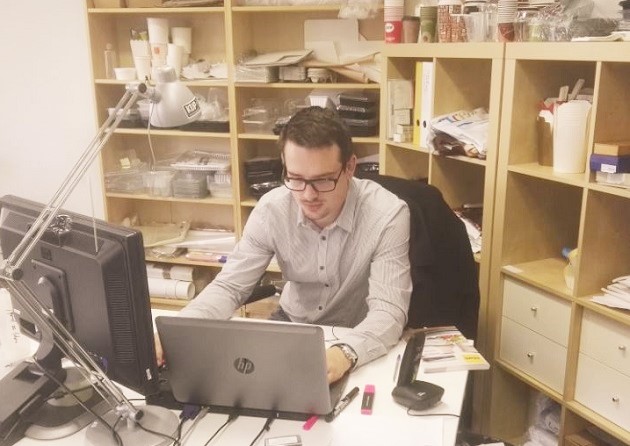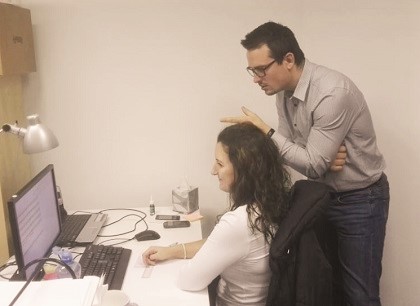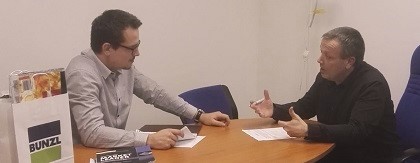Richard Novák is 26 years old and lives in Prague. He told us what it means to be Christian in his everyday job as an accounts manager for a packaging distribution company.
 Richard Novák at his workplace in Prague (Czech Republic).
Richard Novák at his workplace in Prague (Czech Republic).
The Czech Republic in Central Europe is one of the most secular countries in the world. There may be fewer than 40,000 evangelical Christians out of a nation of 10.5 million.
Because there are so few Christians, the workplace provides a particularly excellent opportunity to demonstrate the reality of one’s faith.
This interview is part of a series exploring different ways Czech Christians are dealing with the opportunities and challenges of living out their faith in the secular workplace. We hope you find this encouraging as you wrestle with your own situation.
Richard Novák is an accounts manager for a packaging distribution company.
He lives with his wife south of the capitol city of Prague. Richard represents one of the many “everyday” Czech Christians who are working “everyday jobs” as they shine the light of Christ in their country.
Question. What is your background? What kind of work do you do? Would you like to share anything about your family?
Answer. My name is Richard Novák, 26 years old. I was born to a recently believing couple in 1991, two years after the political “Velvet Revolution,” two years before Czechoslovakia’s “Velvet Divorce.” As a child I lived in a small village with my younger brother and sister, where my parents were trying to do some missionary activities. My father established a small church in Tachov, which we were part of until my 5th year. As a United Methodist Church pastor, my father was moved by the bishop and superintendent to another small church in Trebon. That’s where my brother and I went through high school.
While my family was in Trebon, my brother and I started university in Prague. It was economics and management for me. After fifteen years my parents were moved again, this time to a church in Prague, Horní Pocernice. And yes, a small church again. Now it is five years later and my parents are going to their next, and I think last, journey (to a small church in Protivín) this summer. This is the first time they are going without us. Me and all my siblings except for my youngest sister are all out living our own lives now. My wife and I have been married for a little over a year. I have been working in my current job for one and half years (I am a Key Accounts Manager for a company distributing packaging materials). My wife and I just recently bought a little house 40 kilometers south of Prague.
There are seven Key Account Managers (business men) in our company. Our main responsibilities are managing our cooperation with our most important customers at B2B trade. So I do a lot of talking with businessmen (mainly in the purchasing departments), analyzing their portfolios, making offers, reacting to their demands, managing the state and amount of goods in stock and looking for new acquisitions. Our porftolio consists of one-use dishes, plastic films, cleaning tools, protection tools and other similar items. My main customers are petrol stations and HoReCa wholesale stores.

Q. How did you become a Christian?
A. I was born into a Christian family and raised as a Christian. It may sound strange, but I never experienced any dramatic conversion in my life. Maybe nowadays, because I am experiencing ‘real life’ on my own, I am a witness of the real God’s power, whom we trust much more intensively than ever. Anyway, I have been raised as a child of God which was and is an every day reality for me and there never was any other way.
Q. How does the fact that you are a Christian influence the way you do your job? Do your colleagues know that you are a Christian?
A. I try to make the fact that I am a Christian known as soon as possible. Usually people around me know after a couple of days. After that it is easier to talk about this theme and it is possible, or at least much more likely, that my colleagues start thinking and talking more openly.
But what I claim is not as important as how I live. It helps me contrarily. I can confirm that if you live as a Christian, people near to you notice, and they can appreciate it and it may even impress them. You are simply different and have something to tell them. The wisdom we receive from our God is something different than this world knows. What is hard for me is that I have to be alert and think about how Jesus would act or answer, I am not always good at it. I especially hate defending Christian mistakes from the Middle Ages and other times Christians have failed in history. Still, I am proud to be a Christian today.
Q. In what way do you regard your workplace as a mission field?
A. I regard all of life as a mission field, and work is part of it. I can not say if I am a good missionary, but I don’t want to keep this message to myself. I fail every day.
I am an introvert and I really don’t like to talk with people so much, I am fine alone. But I try to face up to all opportunities and talk about Jesus.
Q. How do church leaders refer to the workplace as a mission field? Do you think that pastors have a proper understanding of what it is like to be working in an ordinary job?
A. I am not sure. My father was working in ordinary job before he accepted Jesus as his Lord. Pastors usually know what it takes. But it is their job to be a Christian. They have time for Bible study, church meetings, watching Christian videos and so on.
I think it is harder to maintain a good relationship with God in a standard job regime. But pastors are aware of it. Of course, I can not speak about all pastors.
I think more pastors should refer to the workplace as a mission field. I think it is a missed opportunity. I don’t know pastors who would try to get into or even help common workplaces to talk about faith. This kind of initiative could be welcomed as a part of a company culture.
Q. How does your local church support you in the mission field of your workplace?
A. It supports me through a program of Bible study. It supports me by praying. But it is not less important to request this support. This needs to happen more. People don’t ask for prayers or other support in their work, so their local church doesn’t know what they are facing.

Q. Can you tell us about any opportunities you’ve had to talk about your faith with colleagues?
A. Opportunities usually comes from my comments on the some topic. Especially after people around me know that I am a Christian, they sometimes ask me what I think or what I would do. It requires me to be confident in my faith and really mean it. It is crucial to explain the difference between following Jesus and a religion.
Q. What factors made this possible?
A. We have many opportunities to talk while working in my job. My KAMs position has flexible time. It is important people around me know I have no problem with talking about topics related to my faith, and it doesn’t make me feel ashamed or embarrassed.
Confidence is a factor, for sure. We need to be sure God is real and that the Bible is true. We need to have some personal experience of God’s love and power.
We need to genuinely know God and what the Bible says.
Q. How often do these kind of conversations about faith with work colleagues happen?
A. I think I probably have the opportunity to talk about God almost every two weeks or so.
Q. Is "being light" in your workplace context always talking to people about your faith in Jesus? What other ways have you found to be a fruitful follower of Jesus in your work?
A. Being light is about opinions, humbleness, wisdom, being diligent in given work duties, not slandering, not lying and living the life we proclaim a Christian should live.
Q. What types of pressure are most common in you workplace?
A. There is pressure to achieve good business results. There are various tasks that must be fulfilled. And some business meetings are challenging.
Q. How does your walk with Jesus help you navigate these types of pressure?
A. The main facts that helps me are these: 1) This life is preparing us for the main event in the life to come. 2) Some opportunities in my life are simply gifts from God. I haven’t done anything to achieve it. I can rely on God that he will provide for me through it because it is his plan for me. 3) God will take care of us even if I get fired.
Q. What resources have helped you most in your Christian thinking about your work?
A. I am not a reader, unfortunately. But the point is it is not just about my work. This is about all of life. We know who we belong to and who our Father is. We know who made us and who is waiting for us. We know how precious we are to God. The knowledge of this makes us strong, fearless and courageous. When we are selecting a university, making exams, looking for a job, working, getting married, buying a house, repairing a house after we buy it, being pregnant, raising children, facing death and illness, facing war and evil, we are still children of God.
It is not a choice for a Christian to talk or not to talk about Jesus at work. It is our duty to talk about Jesus and the good news.

Las opiniones vertidas por nuestros colaboradores se realizan a nivel personal, pudiendo coincidir o no con la postura de la dirección de Protestante Digital.
Si quieres comentar o